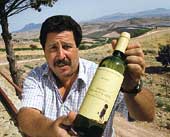 |
| Giuseppe Randazzo with a bottle of wine from a vineyard on the land that was confiscated from the mafia. (Reuters) |
Monreale (Sicily), May 25 (Reuters): Forget about French vintage wine that can set you back a week’s pay. If you really want to impress guests and spice up the table talk, try a bottle of Sicilian red from vineyards that once belonged to mafia dons.
And what better way to gastronomic seduction than to flatter your flame by preparing a dinner of pasta made from wheat grown in a former hit-man’s field.
The sauce, of course, must come from tomatoes and olives you just can’t refuse — also grown on former mafia estates.
The produce is the result of a project known as the “Consortium of Hope”, which puts lands and villas confiscated from the mafia to good use by creating jobs for unemployed youth, teaching people new trades and, most of all, raising the anti-mafia consciousness.
“Cosa Nostra has an immense patrimony that was a symbol of power and intimidation. We are transforming it into rural hospitality centres, vineyards, farms and summer camps,” said Salvino Caputo, mayor of Monreale.
“We felt it was vital that the land did not languish barren and empty,” he said in an interview in his office. “If it had, the message to the people would have been: when the mafia owns the land, it is cultivated and provides jobs. When the state owns it, it is useless.”
Caputo is one of eight Sicilian mayors involved in the project in the territories of towns famous for their mafia heritage, including Corleone of The Godfather fame.
One such metamorphosis from crime to cuisine took place at the Temple of Mount Jato, a rural restaurant high up on the hills overlooking the lush green Jato valley.
The country property once owned by mafia boss Giuseppe Agrigento is now throbbing with weekend diners who come to the area to visit a famous Greek archaeological site nearby.
It employs 10 people, some of them young and with difficult backgrounds. They cook, serve the food and cultivate the land.
Every year the cooperative produces some 20,000 bottles of wine whose label boasts: “From Sicilian land confiscated from the mafia.” It is a message in a bottle if there ever was one.
The label of the white wine gives the word chilling a whole new meaning. Graced by a drawing of a boy looking up at the sun, it is a tribute to Giuseppe di Matteo, a 13-year-old who was killed in 1996 and his body dissolved in acid to punish his mafioso father for turning hostile.
“It’s been hard work and the bureaucracy sometimes makes us regret it, but we see this as a redemption of our land, of the honest part of Sicily,” said Giuseppe Randazzo, who runs the Monte Jato cooperative.
Wine, pasta and sauces made on confiscated land are sold in stores in Italy and abroad. The wine costs about six euros a bottle in Italy.
An eight-hectare estate of vineyards and woodland once owned by Giovanni Brusca, the man who killed Di Matteo, was equipped with an artificial lake in an area that often suffers from drought. He had secretly tapped into Monreale’s municipal water system. The property is destined to be a summer camp.











